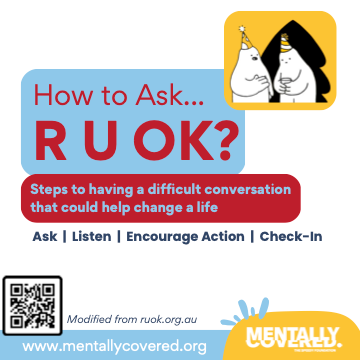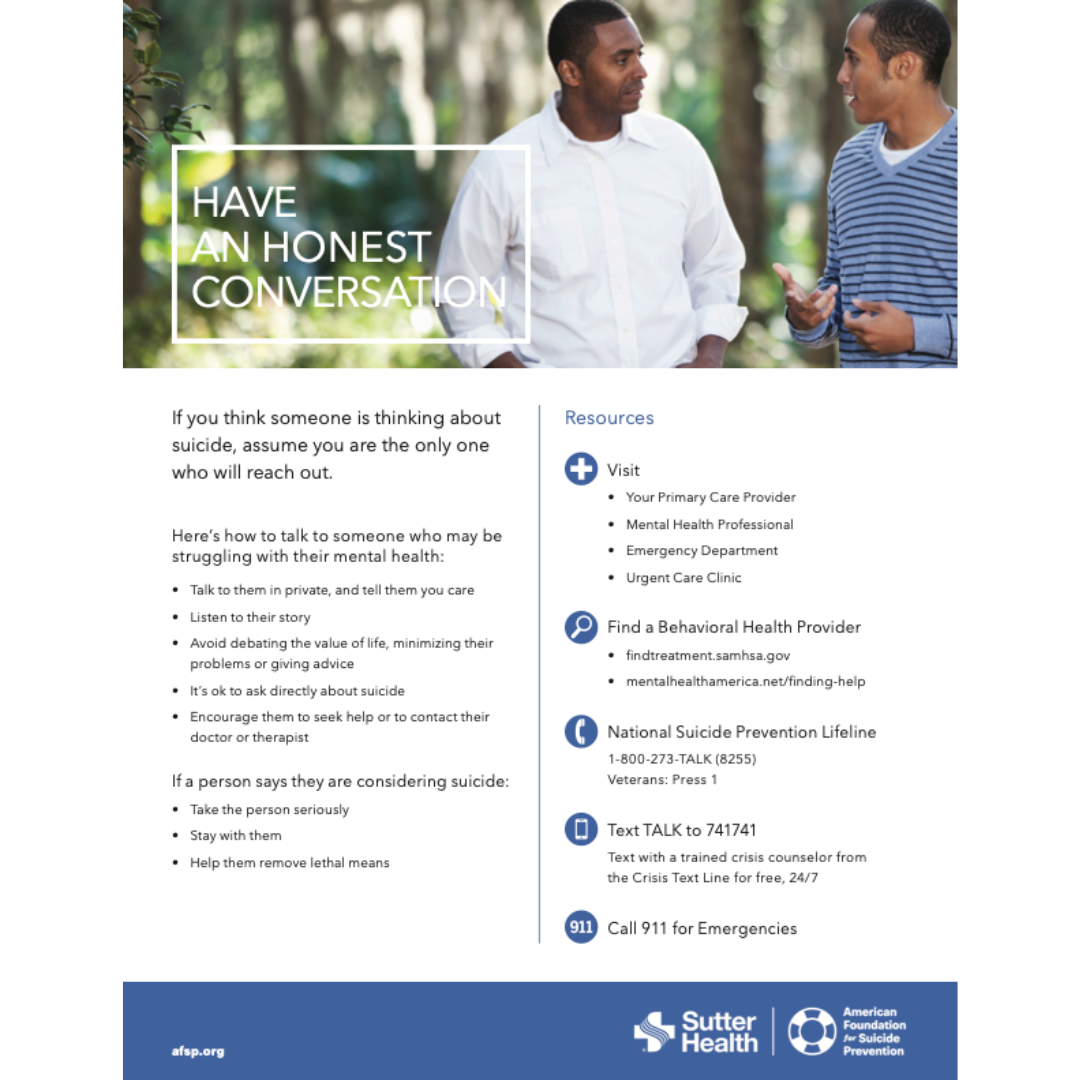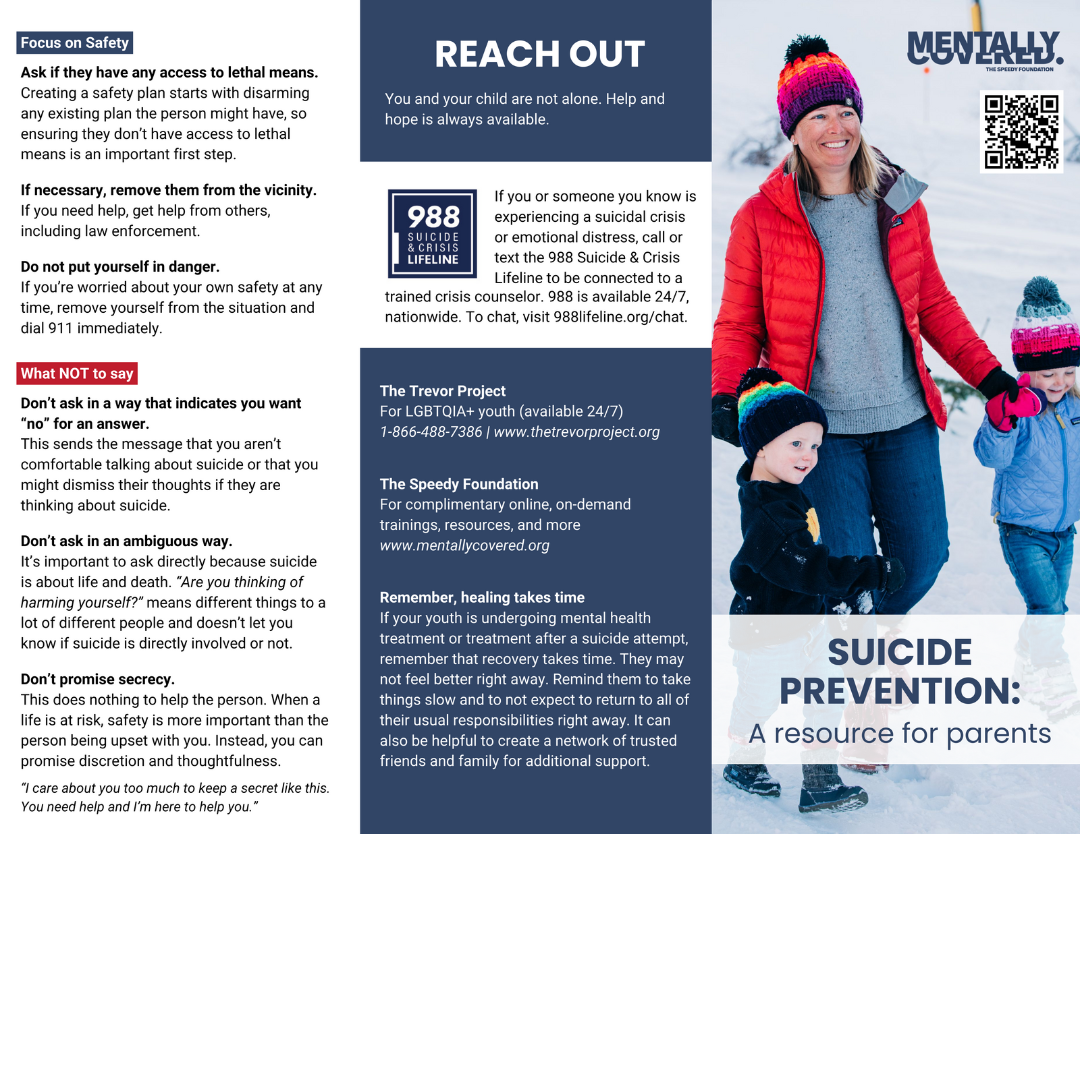Find the Words
Has someone you know been exhibiting one or more of the warning signs of suicide? It's natural to think that a change in behavior is normal, "just a phase," or that it will pass. But, if you sense that something is wrong, don't delay expressing your concerns. Keep reading to learn valuable tips on how to have this difficult conversation with your loved one.
Before the Conversation
Be prepared
It's important to make sure you're prepared before engaging in this conversation. Start by compiling a list of resources and planning what you'd like to say.
Plan to have the conversation at an appropriate time
Plan to have the conversation at a time when you won't be rushed and will have an adequate amount of time to spend with the person.
Prepare specific examples
Have specific examples in mind that help to explain the reasons why you're concerned about this person.
During the Conversation
Mention the signs that prompted you to ask about suicide
Sharing specific examples as to why you're concerned shows the person that you care enough about them to notice when something seems wrong. Specific examples also make it clear to the person that you're not just asking "out of the blue," which can make it more difficult for them to deny that something has been bothering them.
- "I've noticed you've been isolating yourself from friends lately and have been sleeping more than usual. Are you doing okay? I'm here for you."
ASK DIRECTLY ABOUT SUICIDE
Talking about suicide does NOT put the idea in someone's mind. In some cases, it can actually provide them with a sense of relief.
Why is it so important to ask the question directly?
- It lets the person know that you're willing to talk about suicide
- It establishes that you and the person at risk are talking about the same thing
Examples for how to ask about suicide:
- "Sometimes when people feel that way they are thinking about suicide. Are you thinking about suicide?"
- "Are you thinking of ending your life?"
If the Answer is Yes
Determine the level of risk
To determine the level of risk, start by asking the following questions:
- Do you have a plan to kill yourself?
- Have you decided when you'd do it?
- Do you have everything you need to carry out your plan?
If the person answers yes to any of these questions, seek immediate help.
- Call or text the 988 Suicide and Crisis Lifeline
- Call 911 and ask for a trained crisis responder
Listen to the reasons the person has for both living and dying
This might be the first time the person has said out loud that they're thinking of killing themselves. They might be able to convince themselves that it's not the option they want to pursue right now.
They may have been thinking about this for a long time, but not had the chance to share it with anyone - give them the chance to share, uninterrupted and free of judgement.
Validate that they're considering both options
Do NOT give advice. Listen and validate.
Highlight that living is still an option
"You are still here and living is still an option."
Let them know you care
By noticing the signs and starting the conversation, you are already showing the person that you care, but it's important to continue reiterating this.
Let them know you are genuinely concerned and taking the situation seriously
It's very important to be genuine, sincere, and to let them know that you are taking them seriously. They may have shared thoughts with others, but had them dismissed.
If the Answer is NO
Continue to talk and let them know you are there for them
Continue reiterating that you care about them and are there for them. Don't interrupt or try to rush the conversation.
Listen without lecturing or judgement
Instead of judging or lecturing, do your best to acknowledge their experience. If they need time to think, be willing to sit patiently in the silence.
Be vigilant and continue to check in on a regular basis
Stay in touch with the person. Consider setting a reminder to check back in with them in a couple of days or weeks.
Encourage them to use the resources you've gathered
Share resources you've found that may be helpful to them. If they've been experiencing these feelings for more than a couple of weeks, encourage them to seek professional help. You could even offer to help them make the appointment or to accompany them.
Focus on Safety
Ask the person if they have access to any lethal means
Creating a safety plan starts with disarming any existing plan the person might have, so ensuring they don't have access to lethal means is an important first step.
Remove them from the vicinity
If you need help, get help from others, including law enforcement.
Do not put yourself in danger
If you're worried about your own safety at anytime, remove yourself from the situation and dial 911 immediately.
What NOT to Say
Don't ask in a way that indicates you want "NO" for an answer
Instead of letting someone know they can talk about suicide with you, this sends a message that you aren't comfortable talking about suicide or that you might dismiss their thoughts if they are thinking about suicide.
Don't ask in an ambiguous way
It's important to ask directly because suicide is about life and death. You shouldn't ask "are you thinking of harming yourself?" because this can mean a lot of different things to a lot of different people and doesn't let you know if suicide is involved or not.
Don't promise secrecy
Keeping this type of information a secret does nothing to help the person with thoughts of suicide. When someone's life is at risk, safety is more important than the person being upset with you. Instead of secrecy, promise discretion, thoughtfulness, and involved decision making.
- "I care about you too much to keep a secret like this. You need help and I'm here to help you."
Never encourage them to do it
You may be frustrated or angry, but this the most dangerous thing you can say.
Helpful Resources
-
R U Ok Card
Order HereA digital download that provides simple steps for starting a difficult conversation that could save a life.
-
Have an Honest Conversation Flyer
Order HereA set of flyers that that provides resources for reaching out to a loved one in crisis.
-
Suicide Prevention: A Resource for Parents
Order HereA pamphlet that helps parents navigate asking a child if they are considering suicide.




